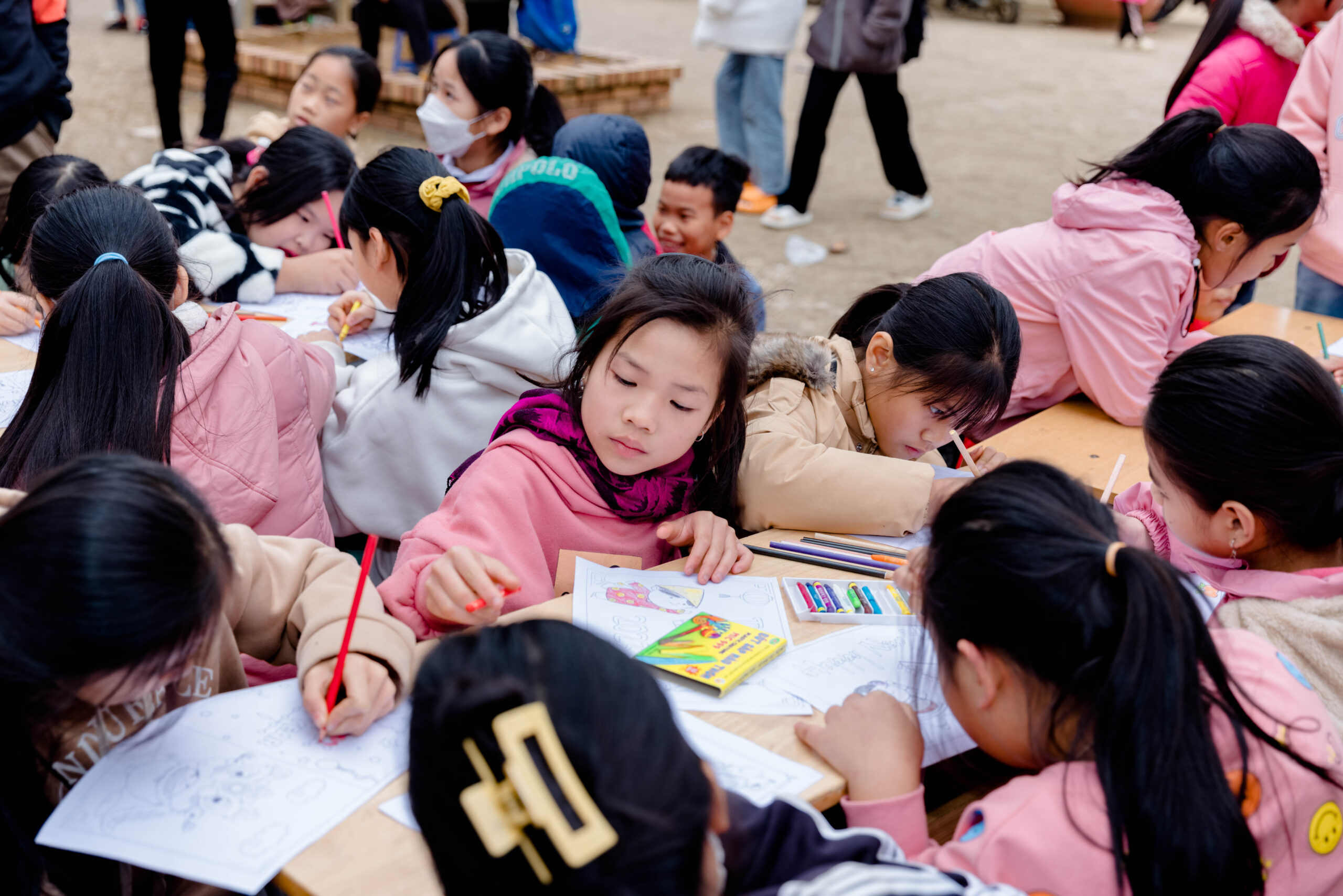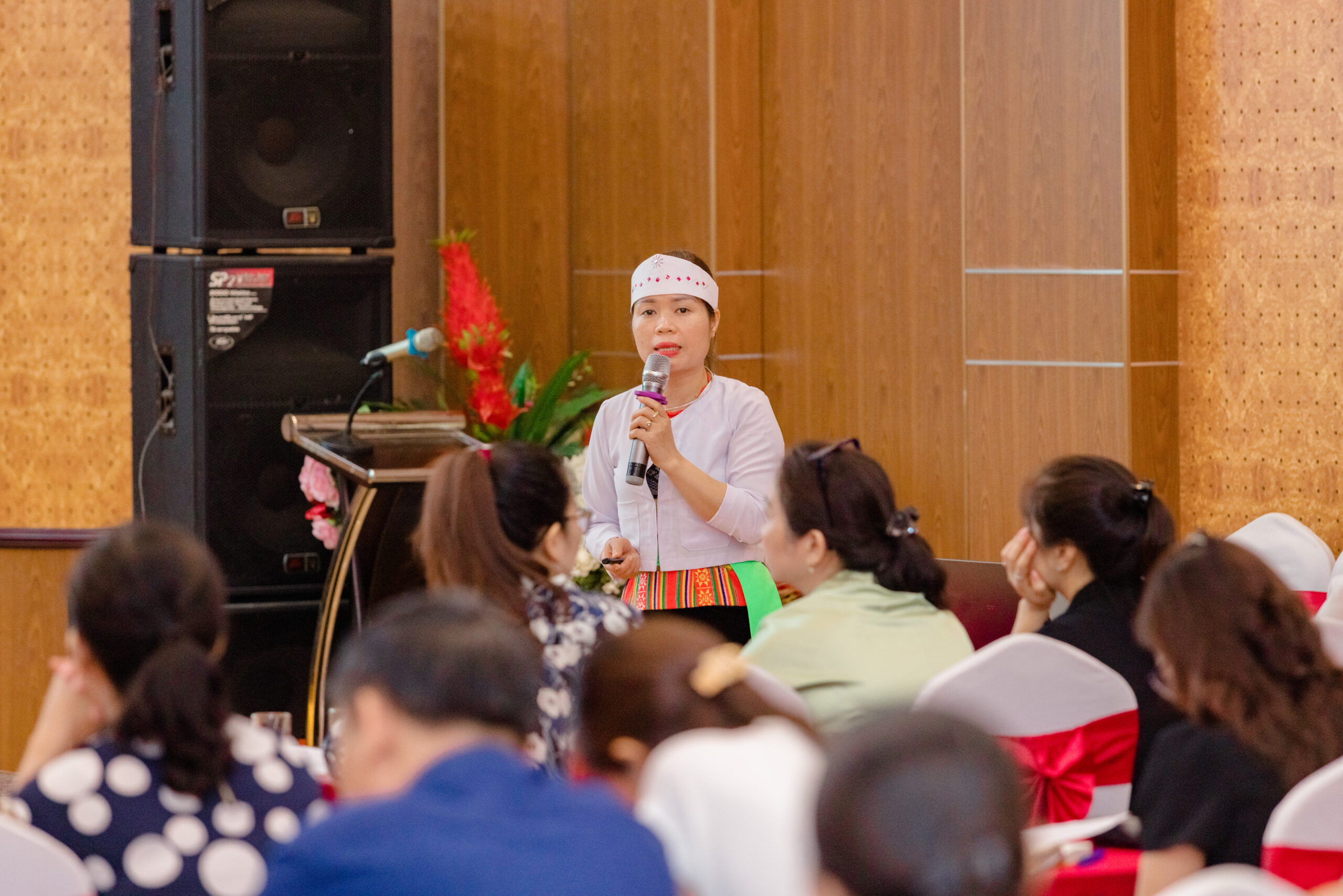A mix of excitement, nerves and sometimes tears – it can be hard to navigate the transition from preschool to primary school. It’s a game-changer for kids, parents and teachers alike. Just ask My and her mum, Thanh, who recently went through one of life’s big changes together. “It’s a big adjustment, but we were prepared,” says Thanh, who lives with her family in Vietnam’s Hoa Binh province.
Last year, both My and her mum took part in ‘Big School Training’ at their local preschool. Parents and teachers from the community learnt how to support young children in the transition period from preschool to primary school. The training focused on strategies to help preschoolers build confidence, make new friends, learn routines, and develop a sense of belonging within a new school setting.
“Starting school might have been scary but it didn’t feel strange because I had already visited and met lots of kids,” says My, now in Year 1.
As part of their training, teachers were encouraged to organise primary school visits so preschoolers like My could experience a ‘Day in the Life’ at primary school, and see what they had to look forward to the following year. My and her friends had the opportunity to visit their local primary school twice before graduating preschool, participating in activities such as decorating classrooms, making toys and music lessons.

“My teacher took me to visit my old preschool. My favourite part was guiding preschool students on how to hold a pen and colour. I like that I get to go back and have preschool students call me ‘big brother’. I’m very happy to help them.”
Loch, 7
As part of their training, teachers were encouraged to organise primary school visits so preschoolers like My could experience a ‘Day in the Life’ at primary school, and see what they had to look forward to the following year. My and her friends had the opportunity to visit their local primary school twice before graduating preschool, participating in activities such as decorating classrooms, making toys and music lessons.
“I remember my preschool teacher taking me and my friends to meet the teachers and students at a primary school,” recalls My. “I also got to see the classrooms and library. My favourite part was all the activities, especially getting to read and sing with the big kids.”
One of these ‘big kids’ was Loc, now in Year 2, who says he has enjoyed helping younger children prepare for primary school, “My teacher took me to visit my old [Thuong Tien] preschool. My favourite part was guiding preschool students on how to hold a pen and colour. I like that I get to go back and have preschool students call me ‘big brother’. I’m very happy to help them.”
Levelling up
Previously, preschool teachers had limited skills organising care and educational activities for students, and they had difficulties in coordinating with primary school teachers, says Ms. Phuong, the preschool’s principal. Instead, they would focus solely on teaching preschool skills.
“I used to only support teachers with basic knowledge and skills such as how to teach children to recognise and pronounce 24 letters and 10 numbers correctly, how to hold a pen, how to colour, and some other skills such as combing and tying up hair and putting on clothes,” she explains. “I honestly did not spend much time coordinating with primary schools to support children during the transition period.”
All that changed when Ms. Phuong signed up for ChildFund’s training courses. As principal, she saw firsthand how kids and their parents were struggling to navigate such a big life change and was eager to make the move as seamless as possible. After two years of hard work, actively engaging in training sessions and workshops, Thuong Tien preschool has seen positive changes for students, teachers and parents in the community.
“I used to only support teachers with basic knowledge and skills such as how to teach children to recognise and pronounce 24 letters and 10 numbers correctly, how to hold a pen, how to colour, and some other skills such as combing and tying up hair and putting on clothes.”
Ms. Phuong
Ms. Phuong says her teachers now integrate content to support children during the transition period into daily school activities and have become more confident in communicating with parents. They also regularly coordinate with elementary school teachers.
Parents have also gained invaluable skills and knowledge to help their children through this tricky time. Thanh says she became more aware of My’s needs and how to best nurture her development both in the classroom and at home, “My told me she gets to draw pictures to help the teacher decorate the classroom. She used to be shy, but now she seems happy and more confident.”
Thanh is proud of the progress both she and My have made over the past year, noting that their bond is stronger than ever. “I always spend at least two hours each night studying with her. I do not pressure her and compliment her when she does something well. I have helped familiarise her with math and physical exercises. I learnt all of this from ChildFund’s training and from a workshop at My’s preschool,” she says. “My is very comfortable at school, and her language skills have improved. She is much more independent.”

It takes a village!
Collaboration and communication – plus the right resources and guidance – are essential when preparing preschool students for primary school. With the support of ChildFund and dedicated educators such as Ms. Phuong and enthusiastic teachers and parents are now thriving. Recently, the preschool was awarded a coveted ‘Level 1 Standard’ by the People’s Committee of Hoa Binh province, a title many schools strive for.
Ms. Phuong says starting school isn’t as daunting for her preschoolers, who are now better at dealing with change. Students are bolder and more confident when participating in lessons and extracurriculars at school, as they are more familiar with the activities and feel supported and nurtured by their teachers and parents.
“To effectively support students in the transition period we need schools, families and children to work together in harmony,” says Ms. Phuong. “All three elements are important. Schools can create an effective learning environment while families help support children’s learning and development at home, and naturally we want children to feel happy going to school and eager to learn.”
This project is delivered in partnership with the Australian Government through the Australian NGO Cooperation Program (ANCP).

































